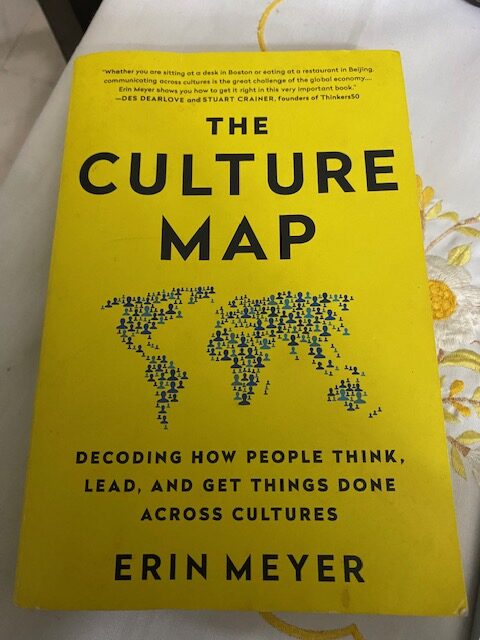“Whether you work in a home office or abroad, business success in our ever more globalized and virtual world requires the skills to navigate through cultural differences”.
The book opens with a personal story; the realization that in communicating with eastern cultures, one should remember to listen to subtle, unspoken cues to make communication effective.
Intercultural communication is an integral part of all business communication. As such, all business communication facilitators need to include this in their training schedules.
Erin Meyer’s book, The Culture Map, explains various facets of intercultural communication in an easy and enjoyable manner. Stories illustrating intercultural dilemmas explain cultural dimensions in an easy-to-understand manner.
The book takes off from the learnings of other interculturalists. It focuses on what she calls ‘Cultural Relativity’ from the point of eight scales which all Business communication trainers are familiar with.
The eight scales are
- Communicating: low context versus high context
- Evaluating: Direct negative feedback versus indirect negative feedback
- Persuading: Principles first versus application first
- Leading: egalitarian versus hierarchical
- Deciding: Consensual versus top-down
- Trusting: Task-based versus relationship-based
- Disagreeing: Confrontational versus avoiding confrontation
- Scheduling: linear-time versus flexible-time
Erin Meyer explains all cultural dilemmas by mapping each culture with another on these scales. For example, in communicating an Indian may be considered as high context while dealing with an American; However, when dealing with a Japanese colleague he may come across as brash and forthright. What matters is the relative positions of the cultures in respect to that dimension. While the British, French and the Argentinians may be considered high context in comparison with Americans, an Indian would view the British as a low-context communicator.
The book takes us through different feedback styles; direct- positive, indirect-positive, direct- negative and indirect-negative. Illustrating through interesting stories, she talks of the American style which has direct-positive and indirect-negative, while a French person applies an indirect-positive and a direct-negative style. This is likely to lead to misunderstanding in a global team where both the French and American need to work together.
All other scales are explained with diagrams and graphs as well as stories. This helps in integrating these concepts into one’s training programs.
What I particularly liked about the book was the numerous references to the Eastern hemisphere. Erin Meyer has worked extensively with the Chinese, Indians, Japanese, Singaporeans as well as Koreans. The examples used are relatable and descriptive making the book an easy and enjoyable read.
In her concluding section, she talks of how we are all the same and yet we are all different. We are all human and may be driven by common physical and psychological needs and motivations. Yet the culture in which we grow up has a profound impact on how we see the world.
When we worked in an office surrounded by people form our own culture, awareness of psychological needs and sensitivity to individual differences is enough. But ,as globalization transforms the way we work, we now need the ability to decode cultural differences in order to be effective at the workplace.
Some of the comments about the book are:
“ Although we live in an increasingly digitally connected and virtual business world, The Culture Map reminds us that understanding cultural differences in human interactions still matters…… The Culture Map will help business leaders become ‘cultural bridge builders’ to the benefit of their teams and organisations.” Dr Didier CL Bonnet
“Erin Meyer provides us with a brilliant guide to what all business leaders need to know right now: how to succeed in managing the diverse cultural contexts of today’s workplace.” Marshall Goldsmith
About the author
Erin Meyer is an American author and professor at INSEAD Business School, based in Paris. She is most known for writing the 2014 book, The Culture Map: Breaking Through the Invisible Boundaries of Global Business a study that analyzes how national cultural differences impact business. She is also known for co-authoring the book with Netflix CEO, Reed Hastings, No Rules Rules: Netflix and the Culture of Reinvention, which became a New York Times best seller in October 2020.
Meyer is a professor of management practice in the Organizational Behavior department at INSEAD, an international business school with campuses in France, Singapore and Abu Dhabi. She regularly speaks about cross cultural management and global teamwork
